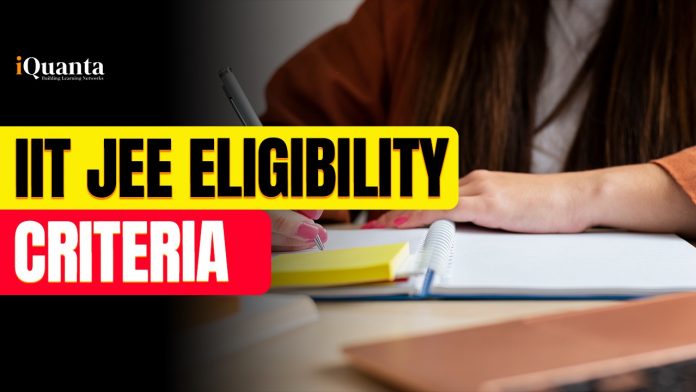The IIT JEE examination unfolds in dual phases, where the initial phase, JEE Main, serves as the gateway to NITs, IIITs, and CFTIs under the aegis of the Central Seat Allocation Board. Subsequently, the JEE Advanced, constituting the second phase, awaits the top 2.5 lakh performers from JEE Mains. Triumph in JEE Advanced secures a coveted spot within the esteemed Indian Institute of Technology (IIT) campuses. In this article, we have discussed IIT JEE Eligibility Criteria 2025 in detail.
IIT JEE Age Eligibility 2025
For appearing in the JEE (Main) – 2025, there is no age limit for the aspiring candidates. The candidates who have passed the class 12/equivalent examinations in 2023, 2024, or appearing in 2025 irrespective of their age can appear for JEE (Main) – 2025 examination. However, the candidates may be required to fulfil the age criteria of the Institute(s) to which they are desirous of taking admission.
IIT JEE Eligibility Criteria 2025: Subject Combinations Required
Subject Combinations Required in the qualifying examination for admission to B.E./B.Tech. & B. Arch./B. Planning Courses in NITs, IIITs, and other CFTIs is as under.
| Courses | Required Criteria based on Class 12th / Equivalent qualifying Examination |
|---|---|
| B.E/ B.Tech | Passed qualifying examination with Physics and Mathematics as compulsory subjects along with one of the Chemistry/Biotechnology/Biology/ Technical Vocational subject. |
| B.Arch. | Passed qualifying examination with Mathematics, Physics, and Chemistry as Compulsory Subjects. |
| B.Planning | Passed qualifying examination with Mathematics, Physics, and Chemistry as Compulsory Subjects. |
IIT JEE: State of Eligibility
The State code of eligibility refers to the specific code assigned to the state where a candidate completed their Class 12 (or equivalent) qualifying examination. This code determines the candidate’s eligibility to take the JEE (Main) – 2023 exam. It’s crucial to understand that the State code of eligibility is based solely on the state where the candidate completed their qualifying examination, not their native place or current residence.
For instance, if a candidate completed their Class 12 qualifying examination in New Delhi but resides in Noida, Uttar Pradesh, their State code of eligibility will be that of Delhi, not Uttar Pradesh.
Similarly, if a candidate passed their Class 12 examination in one state but opted for improvement exams in another state, their State code of eligibility remains tied to the state where they initially passed their Class 12 examination, not the state where they took improvement exams.
Get JEE Online Coaching by iQuanta
List of Qualifying Examinations
- The final examination of the 10+2 system is conducted by any recognized Central/ State Board, such as the Central Board of Secondary Education, New Delhi; Council for the Indian School Certificate Examinations, New Delhi; etc.
- Intermediate or two-year Pre-University examination conducted by a recognized Board/ University.
- Final examination of the two-year course of the Joint Services Wing of the National Defence Academy.
- Senior Secondary School Examination conducted by the National Institute of Open Schooling with a minimum of five subjects.
- Any Public School/ Board/ University examination in India or any foreign country is recognized as equivalent to the 10+2 system by the Association of Indian Universities (AIU).
- Higher Secondary Certificate Vocational Examination.
- A Diploma recognized by AICTE or a State board of technical education of at least 3 years duration.
- General Certificate Education (GCE) examination (London/Cambridge/Sri Lanka) at the Advanced (A) level.
- High School Certificate Examination of the Cambridge University or International Baccalaureate Diploma of the International Baccalaureate Office, Geneva.
- Candidates who have completed the Class 12 (or equivalent) examination outside India or from a Board not specified above should produce a certificate from the Association of Indian Universities (AIU) to the effect that the examination they have passed is equivalent to the Class 12 Examination.
- In case the Class 12 Examination is not a public examination, the candidate must have passed at least one public (Board or Pre-University) examination earlier.


